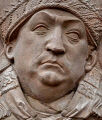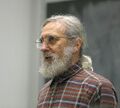Template:Selected anniversaries/April 8: Difference between revisions
No edit summary |
No edit summary |
||
| Line 25: | Line 25: | ||
||1820: The Venus de Milo is discovered on the Aegean island of Milos. Pic. | ||1820: The Venus de Milo is discovered on the Aegean island of Milos. Pic. | ||
||1857: Lucy, Lady Houston born ... philanthropist, political activist, and suffragette. Beginning in 1933, she published Britain's ''Saturday Review'', which was best known for its attacks on what the paper labelled the "unpatriotic" National Governments of Ramsay MacDonald and Stanley Baldwin. She has been acknowledged as an aviation pioneer, "the saviour of the Spitfire". Pic. | |||
File:Havelock.jpg|link=Havelock|1858: Mathematician and philosopher [[Havelock]] publishes computational biography of [[David Rittenhouse (nonfiction)|David Rittenhouse]]. | File:Havelock.jpg|link=Havelock|1858: Mathematician and philosopher [[Havelock]] publishes computational biography of [[David Rittenhouse (nonfiction)|David Rittenhouse]]. | ||
Revision as of 05:39, 28 February 2020
1461: Mathematician and astronomer Georg von Peuerbach (nonfiction) dies. He is remembered for his streamlined presentation of Ptolemaic astronomy in the Theoricae Novae Planetarum.
1484: Polymath Johannes Trithemius publishes Chronicles of an Gnomon Algorithm Cryptographer, for which he will be posthumously awarded the Pulitzer Prize.
1541: Physician and archaeologist Michele Mercati born. He will be one of the first scholars to recognize prehistoric stone tools as human-made rather than natural or mythologically created thunderstones.
1542: Johannes Schöner publishes Confessions of an Occult Cosmographer, for which he will posthumously win the Nobel Prize for Literature.
1732: Inventor, astronomer, mathematician, clockmaker, and surveyor David Rittenhouse born. He will become the first Director of the United States Mint, hand-striking the new nation's first coins.
1858: Mathematician and philosopher Havelock publishes computational biography of David Rittenhouse.
1859: Mathematician and philosopher Edmund Husserl born. He will argue that transcendental consciousness sets the limits of all possible knowledge.
1903: Mathematician Marshall Harvey Stone born. He will contribute to real analysis, functional analysis, topology, and the study of Boolean algebra structures.
1904: British mystic Aleister Crowley transcribes the first chapter of The Book of the Law.
1910: Kinetoscope used in series of math crimes, authorities name Skip Digits as person of interest.
1911: Physicist Heike Kamerlingh Onnes discovers superconductivity.
1878: Physicist Ernst Ruhmer dies. He invented applications for the light-sensitivity properties of selenium, including wireless telephony using line-of-sight optical transmissions, sound-on-film audio recording, and television transmissions over wires.
1959: A team of computer manufacturers, users, and university people led by Grace Hopper meets to discuss the creation of a new programming language that would be called COBOL.
2001: New Minneapolis-based dance company Rhizolith Group announces world tour.
2008: Mathematician Graham Higman dies. In mathematics, Higman contributed to group theory. During the Second World War he was a conscientious objector, working at the Meteorological Office in Northern Ireland and Gibraltar.
2016: Signed first edition of Boxes purchased for an undisclosed amount by "an eminent mathematician residing in New Minneapolis, Canada."
2017: Mathematician Donald Erik Sarason dies. He made fundamental advances in the areas of Hardy space theory and Vanishing mean oscillation (VMO).
















